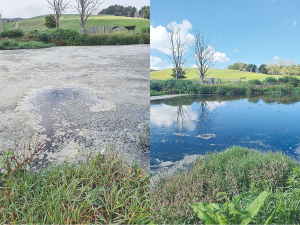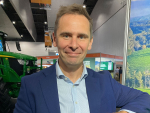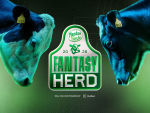A new effluent management product, flushed down the drain during routine shed washdown, is a game changer, according to the man in charge of its distribution in New Zealand.
Biostack, which comes in a liquid form, contains, among other ingredients, a bacteria that uses sunlight to work. The bug, technically known as a photoautotroph, utilises energy from light to synthesise organic matter.
Dairy nutritionist Michael Henne became interested in the technology while farming in the US in 2016. In particular, he saw it as an overlooked way to recycle nitrogen and to generate additional dry matter tonnage in New Zealand’s pasture dairy system.
“In America, they were mostly using it on koi ponds and fish tanks – what a waste,” he told Dairy News.
Now resident in New Zealand, Henne launched the product through his employer, Hyprecision Ag Ltd, last year, after several seasons of trials and dosage adjustment to suit local conditions.
“The most valuable factor in utilising biology is having a protocol that consistently works across system types and in the broadest possible set of conditions.”
Henne told Dairy News that his technology is really starting to take off in NZ, as farmers realise the untapped value in their ponds.
“It’s absolutely unique in the bacterial consortium and their robustness and longevity, due to the photoautotroph. Biostack solves a regulatory and cost problem, but just as importantly, it turns the manure pond into a predictable production resource.”
Henne took Dairy News to a 1,000 cow farm near Mercer which has been using the product. The farm has a liner pond with a large reflective surface. Within 15 minutes of administration, plumes of bubbles appeared along with foam on the surface. Henne says it’s not atypical to see the bacteria start ripping solids off the bottom within the same timeframe.
“On this farm, they are now irrigating green amber liquid and not black sludge,” he says.
“It has also got rid of the smell.”
Henne says the product changes the whole notion of handling solids.
“When we get sunlight on the surface of the pond, the bacteria digest the solids into green liquid and there is virtually no need for the farmer to spend money on a digger to dredge solids.
“Biostack also solubilises micronutrients like nitrogen and phosphorus and retains them during dormancy. This means that when you pump effluent on the paddock or emerging crops, you are taking the micronutrients to the plant, fostering additional growth.”
The product is packaged in a four-litre bottle and dosage is based on cow numbers. Available from Hyprecision Ag, Animal Health Direct and several farmer dealers.
Stacking Up
Accelerates breakdown of surface crusts and floating organic solids.
Accelerates breakdown of bottom sludge.
Associated with more rapid maturation of grasses in the paddock and increases in dry matter tonnes.
Reduces or eliminates the need for dredging.
Break down solids in the manure pit entirey, making them irrigatable.


















